Elizabeth May, activist-lawyer-pillar of strength-Green Party of Canada leader
“It’s essential, (in order) to be able to be constructive, that you see what’s positive.”
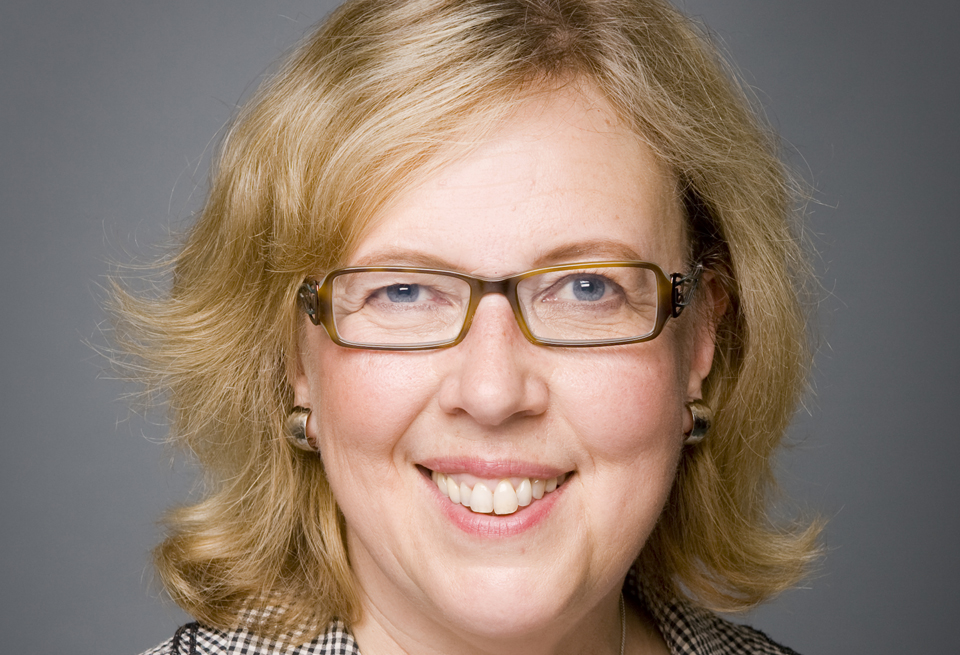
All photos courtesy of Green Party of Canada
A little while back, I got the following email from Ottawa-South Green Party of Ontario member James Mihaychuk:
“You need to get Elizabeth May on your site. Elizabeth has been an activist, environmental lawyer, federal policy advisor, head of the Sierra Club Canada, our first elected Green MP, and was the 2012 Parliamentarian of the Year as selected by other MPs.”
Quite the endorsement. Not that the Green Party of Canada leader really needs it. She’s had an extraordinary life so far.
Read through Elizabeth’s Green Party bio or Wikipedia entry and you’ll learn that she was just a teenager when she led a successful campaign to prevent insecticide spraying on the forests of Cape Breton Island, Nova Scotia. That finances kept her from finishing an undergraduate degree, but that she got through Dalhousie Law School anyway as a mature student (graduating in 1983 with a reference letter from then-Governor of Arkansas Bill Clinton).
You’ll find out that she helped found the Canadian Environmental Defence Fund and spent 17 years as the Executive Director of the Sierra Club Canada. That she has seven books to her name and has received three honourary doctorates, from Mount Allison University, the University of New Brunswick and Mount Saint Vincent University. That she’s worked tirelessly for the rights of women, and for indigenous peoples around the world, particularly in the Amazon and in Canadian First Nations communities.
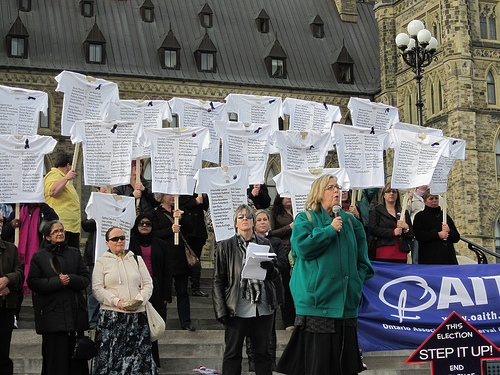
At the rally for a National Action Plan to End Violence Against Women and Girls in Canada, Ottawa, Ont., October 2012
You’ll also read about Elizabeth’s many honours and awards, including:
- International Conservation Award from the Friends of Nature Conservation Society (1985)
- United Nations Global 500 award (1990)
- Commemorative Medal for the 125th Anniversary of the Confederation of Canada (1992)
- Elizabeth May Chair in Women’s Health and the Environment from Dalhousie University (1998)
- Harkin Award from the Canadian Parks and Wilderness Society (2002)
- Officer of the Order of Canada (2005)
- Couchiching Award for Excellence in Public Policy (2006)
- Newsweek Magazine: One of World’s Most Influential Women (2010)
- Maclean’s Parliamentarian of the Year (2012)
There’s no doubt Elizabeth is leading an extraordinary life full of accomplishments. But first and foremost, she’s an extraordinary person.
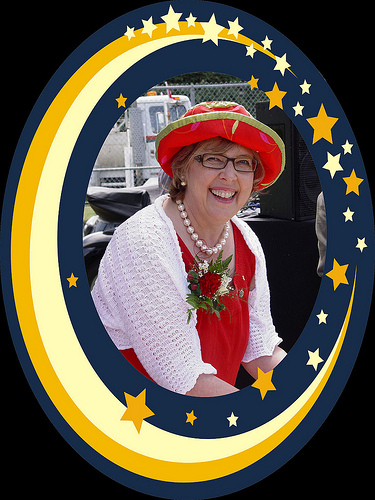
Code of honour
In preparing for this piece, I talked to a number of friends and colleagues who are involved in the environmental sector, and read some of the many writings on her work (including this excellent Vancouver Observer article by Tom Graff). From all that, I put together a shortlist of the attributes that make Elizabeth a true Kickass Canadian—in other words, the honours she bestows on us:
- Respect – Above all, Elizabeth believes in playing fair and practicing “Love your neighbour as yourself” politics. Collaboration, cooperation and giving a voice to all are at the top of her list of priorities.
- Optimism – No matter what obstacles are thrown in the way of protecting our planet and its people, she refuses to be overwhelmed by the negative. Her reasoning? “It’s essential, (in order) to be able to be constructive, that you see what’s positive.”
- Dedication – Since her earliest years, she has worked hard to fight for her beliefs and create a better world for everyone. And she plans to continue doing so for the rest of her working life (which she foresees taking her into her 80s).
- Courage – Whether it’s being the Green Party’s lone voice in the House of Commons, or resigning in 1988 as Senior Policy Advisor to the federal Environment Minister because environmental assessments weren’t being performed, Elizabeth is fearless about speaking her mind and defending her ideals.
- Selflessness – She has committed her life to public service and contributing to the greater good. Even when that means working 20-hour days, seven days a week, and sacrificing her personal life. “I have no partner,” she says. “Nobody would put up with how much I work.”
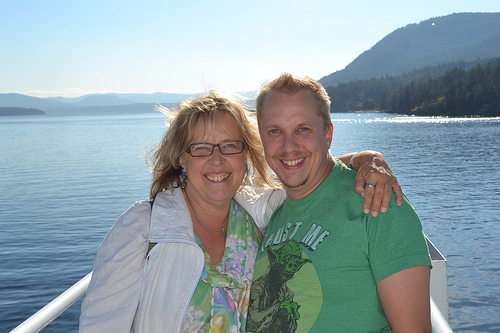
With a Green supporter, Vancouver Island, B.C., August 2012
“Elizabeth May is the embodiment of a real-life Mother Nature and the epitome of a Kickass Canadian. Right now, she is the most important voice in Canada standing up for our right to a healthy planet and happy, healthy, lives for all. Her work goes beyond the typical environmental issues to deal with the most pressing social and economic issues facing Canadians, as well as being a badly needed champion of democracy at a time when it’s most needed. She is a true inspiration to so many (including me), boldly transcending traditional party and other dividing lines like few (if any) politicians before her. Canada is a better place as a result of Elizabeth’s brave and determined leadership… and would be even greater if we only listened to her wise council more often.” —Josh Snider, Manager of Youth Sustainability Leadership with The Natural Step Canada, volunteer with Ecology Ottawa
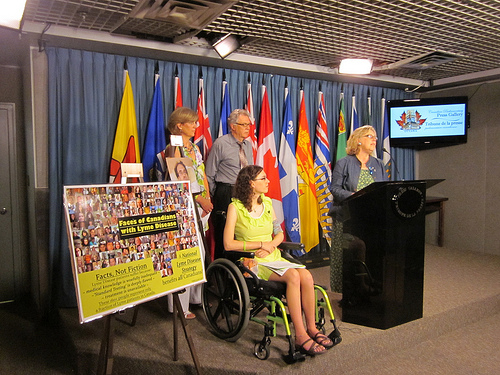
Speaking at a Lyme disease press conference, June 2012
Political leanings
According to her mother, who passed away in August 2003, Elizabeth’s passion for the environment and those around her is innate. “She used to say that I showed concern for the environment before she did, sort of from my toddler stage,” says Elizabeth. “So I can’t really explain it because it seems to have pre-dated any parental influence.”
Elizabeth does, however, credit her parents for making her understand that “each of us has power in a democracy, and that we have to use our tools and obligations as citizens, on issues that we care about.”
Her parents must have been very proud. She has dedicated much of her life to working with volunteer-based environmental organizations and influencing people in government though effective citizenship. She teaches others to do the same, both by her exceptional example and in more direct ways; her book How to Save the World in Your Spare Time outlines the tools we need to follow her lead.
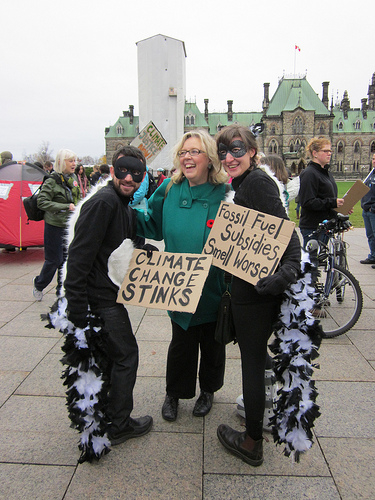
At Powershift 2012: Toxic Trick-or-Treat, Ottawa, Ont., October 2012
Of course, as founder of the Small Party, which was launched in 1980 and became the Green Party of Canada in 1983, and as the organization’s current leader, her career has taken her onto more formal political turf. But she points out that taking an official political position isn’t the most effective way of bringing about change in a democracy, and that it wasn’t always her intention to go that route.
“When I launched the Small Party in 1980, it was, as far as I was concerned, a one-shot effort, a ‘beau geste’ to make sure that, at least in as many campaigns as possible, there would be candidates running for the Small Party who would raise issues of environment, sustainability and social justice and so on,” she says. “In my mind, it didn’t start out as an attempt to build a new political party.”
But that was then. “In our current circumstances, I think we need people who are willing to leave NGOs and run for parliament,” she says. “It’s critical that we have effective advocacy in civil society and inside parliament, and, ideally, that we are able to form government from Members of Parliament who are fully committed to an agenda that is based on policies that reinforce the likelihood that our children will be in a livable world.”
“Elizabeth May is a tireless and dedicated leader who is devoted to creating a more supportive and equitable society. She understands that a healthy society depends on a healthy environment. It’s inspiring to see such an astute and passionate environmental advocate who actually walks the talk.” —Sonia Wesche, Assistant Professor, Geography, University of Ottawa
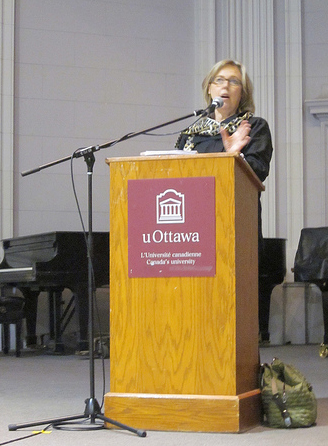
Speaking at uOttawa, March 2013
Freedom of speech
As Green MP for Saanich-Gulf Islands and leader of the Green Party of Canada, Elizabeth is committed to facilitating a more democratic system. She speaks candidly about the difference between the freedoms she and her fellow Green Party members share, and the stringent control faced by MPs in other parties.
“I’ll certainly enjoy it when there are more than 12 members of the Green Party in parliament,” she says, “but no matter how many of us there are—which at the moment is just one—I wouldn’t trade places with any of the other people in parliament.
“Well, I would trade places with (Prime Minister) Stephen Harper, I’ll give you that. But I wouldn’t trade places with the others, because they’re all told what to do and when to say it and when to stand up and when to sit down, and I think it’s outrageous because there are people there who have life experience that’s valuable, but they’re not allowed, really, by the political party system in which they find themselves, to make much use of their personal skills and background and experience. They’re treated as if they’re mere cogs in a wheel.”
She sees the idea of political party discipline as verging dangerously close to being unconstitutional. “It certainly isn’t in the constitution that members of parliament serve political party leaders,” she says. “In fact, political parties aren’t mentioned in the constitution. What’s said in the constitution is that we are representatives of an electoral district and that the voters of that riding are the boss. I think if we were freer as MPs, democracy would work better.”

Elizabeth and Victoria, B.C. Green Party candidate Donald Galloway speaking to the press, November 2012
That belief is fundamental to the way the Green Party operates. Elizabeth is proud of the fact that all the Greens—not just their leader—are able to speak their minds and freely represent the interests of their constituents.
“We work unconstrained by spin doctors and political operatives, who see every session of parliament as an opportunity to advance poll numbers by a digit or two in advance of an election that won’t happen for a couple of years,” she says. “That notion of working under a political master is not what parliament is supposed to be.”
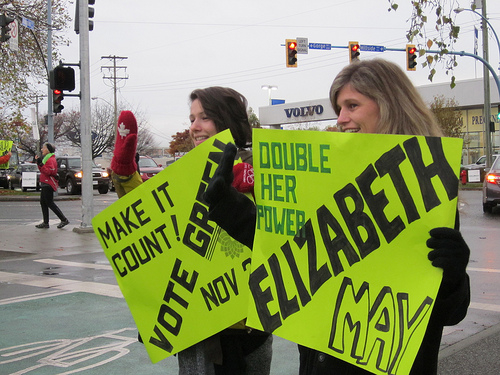
The Morning Wave with Donald Galloway, November 2012
Losing confidence
More and more, Elizabeth is disheartened by the deteriorating conduct in the House of Commons. “Decorum in the House when I worked for the Mulroney government was certainly better than it is now,” she says. “We didn’t have the hyper-partisan control that extends now, not only from the House of Commons on votes and during Question Period, but it also extends to parliamentary committees, which used to be much more nonpartisan and cooperative.
“In previous parliaments, it was not at all the case that members of the front bench, cabinet members, would heckle when opposition members were trying to pose their questions. This is new and it’s very distressing and it happens all the time.”
That behaviour is all the more disturbing when you consider the current climate of youth bullying and the federal government’s efforts to curtail it. It’s hard not to wonder at the hypocrisy of national anti-bullying initiatives when the House of Commons has become a breeding ground for bullying on a daily basis.
Not everyone is a perpetrator, of course. “There are some repeat offenders and others who never do it at all,” she says. “But the heckling from ministers and the Crown during Question Period is just shocking to me… So many of my colleagues (in Ottawa) don’t really know how it used to be, so they’re not aware of how flagrantly routinely the norms of previous parliaments are being ignored or abused.”
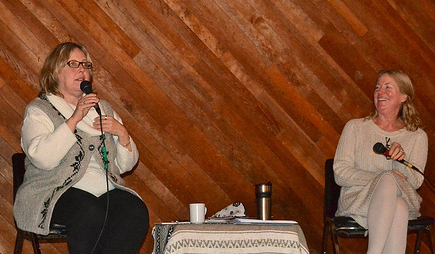
At the Climate Change Discussion Panel with Lisa Barrett, Salt Spring Island, B.C., January 2013
Elizabeth says that a number of simple actions could easily be taken to get the House back in order. For one thing, the Speaker could exert more control over “serial abusers” of the system by keeping them out of the chamber or refusing to recognize them. For another, the party leaders could have—and, she says, should have—less control over their MPs.
“The motivations of individual MPs are almost not a factor (in the decisions they make). Because of how tightly MPs are controlled, their motivations are basically at the point of, ‘How much of this do I take without feeling that I’ve made the wrong choice with my life,’ as opposed to thinking, ‘What’s the right policy direction, what could I do differently, how could we as parliamentarians restore the faith of Canadians in parliamentary democracy?’”
This is a subject Elizabeth has thought a lot about; her latest book, Losing Confidence: Power, Politics and the Crisis in Canadian Democracy, explores it in great depth. The solution, she says, is to get rid of the power of the party leaders, and the power of the Prime Minister’s Office “that doesn’t exist in the constitution.”
To address the first point, she recently introduced Bill C-503, a private member’s bill to amend the Canada Elections Act to allow for local endorsement of a candidate so that party leaders no longer have to sign the nomination papers.
As for the second point, she says, “there’s no excuse for the Prime Minister’s Office to have $10 million a year and an unlimited amount of staff. We don’t get a breakdown by category of where that money is going… The Prime Minister and Cabinet and the Privy Council are acting as though they’re operating under a different constitution, as though they’re above the law. So the concept of supremacy of parliament is being routinely ignored.
“Historically, there’s never been a Prime Minister who’s had as much power and centralized control over civil service, over Parliament, over parliamentary committees. There’s never been anything close to this amount of centralized control, so you need to break that down.”
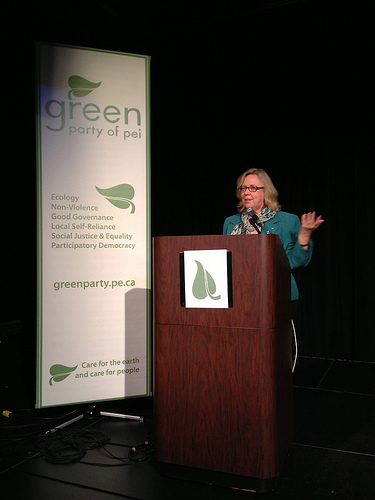
Speaking at the PEI Greens Leadership Convention, November 2012
Elizabeth brings up a recent talk given by former Parliamentary Budget Officer Kevin Page to her riding association at the University of Victoria. “His entire speech was fantastic, but there were two take-away messages. The power of the public purse must return to parliament, and we need to restore the principle that decisions be based on evidence.”
She outlines the many defunct institutions, including the National Round Table on the Environment and the Economy (NRTEE), the National Aboriginal Health Organization (NAHO) and the Law Reform Commission of Canada (LRCC), that previously served to analyze and collect information and evidence “upon which good public policy could be founded.” By eliminating agencies that collected “good information” and redirecting science funding to “business-led and industry relevant science,” says Elizabeth, the Prime Minister’s Office has “distorted the purposes of government science. They’re cutting out the underpinning of the knowledge on which good decisions could be made and they’re centralizing a group of largely arbitrary, ideologically driven decisions out of PMO.”
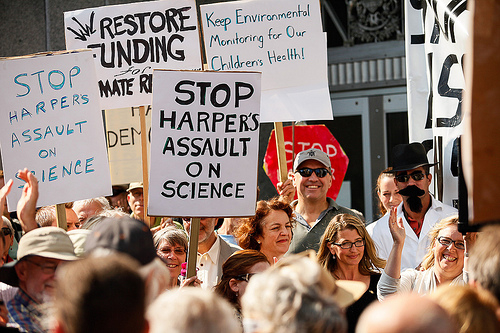
At the Rally for Science, Victoria, B.C., September 2012
She points out that the principle of supremacy of parliament still exists—that the Prime Minister is first among equals, but no more than equal to any other Member of Parliament in the House of Commons. “That’s the principle and the theory of what parliamentary democracy is all about,” she says. “I’m afraid that if Stephen Harper gets that, he doesn’t like it.”
“As a budding news reporter hunting for insights into environmental stories, I remember tapping into Elizabeth May’s wisdom and calling her for quotes pretty regularly when she was heading up Sierra Club Canada. I’ve never officially endorsed a politician before but when she was running for a seat in parliament, I encouraged my readers, be they NDP, liberal or conservative voters, to donate to her campaign because without her passionate voice for the earth on parliament hill, green politics are much more likely to fade to black. If only this woman were our Prime Minister!” —Kickass Canadian Adria Vasil, author (Ecoholic)
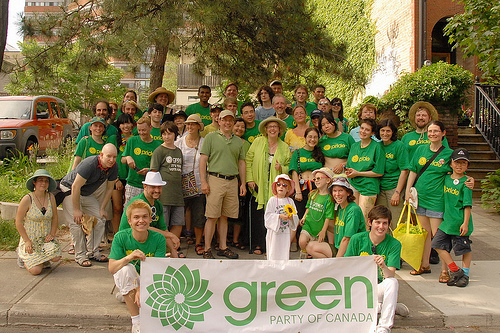
With the Saanich-Gulf Island Greens after the Pride Parade, Toronto, Ont., July 2011
Gaining momentum
In spite of the increasing resistance to causes that she, her party and her supporters hold dear, Elizabeth keeps going. She continues to make the great personal sacrifice she says is required of every MP—one that’s so all-encompassing, it keeps her from spending more time with her daughter, three stepchildren and seven step-grandchildren, and required her to set aside her studies toward becoming an ordained minister with the Anglican Church.
It’s worth it to her because she knows that although it will take “a long time” to repair Canada’s democratic system, “it absolutely can be repaired.”
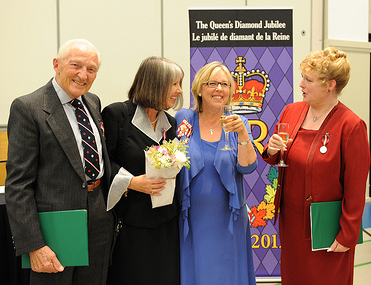
At the Queen’s Diamond Jubilee award ceremony in Saanich-Gulf Islands, Vancouver Island, B.C., September 2012
There are positive signs, not the least of which is Elizabeth being named 2012 Parliamentarian of the Year (which she calls “an overwhelming honour”). Voted on by her fellow MPs, the acknowledgement shows that she has the support of the majority of the House.
“It’s a tribute to the secret ballot,” says Elizabeth, who feels she otherwise wouldn’t have been named. “I think it reflects that there’s a lot of sympathy for what I’m trying to do, from MPs who otherwise couldn’t express it. Whether the MPs who voted for me as Parliamentarian of the Year agree with the Green Party platform, maybe not. But I bet they agree with the idea that individual MPs should be treated with respect and that we should be kinder to each other.”
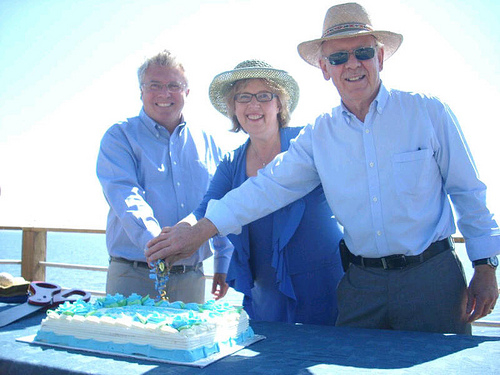
Celebrating the Lochside Revitalization Project, B.C., October 2012
So she will continue along the path she’s charted. She foresees being a parliamentarian for the next 20 years, which would take her “to about age 80, at which point I wouldn’t cost the Canadian taxpayers much on any kind of pension, because I won’t live a whole lot longer than that, so that would work well.”
Among many goals, she hopes to see Canada break its addiction to fossil fuels and begin the transition to becoming carbon-free. And she wants the Green Party to be “part of a functional coalition government in which we are able to pull the strengths that come from all the diverging public opinions and political platforms of various parties.”
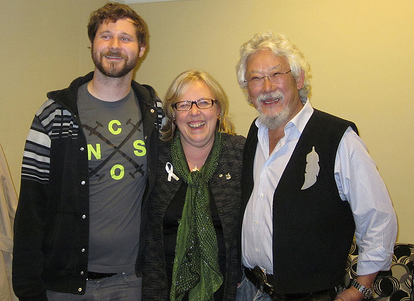
With David Suzuki (right) and musician Dan Mangan, November 2012
Public interest
During my interview with Elizabeth—which took place on World Environment Day (WED), in fact—she recounts a conversation she’d had a few hours before with a Conservative MP:
“I said, ‘Wouldn’t it be great if we just went down to the Centennial Flame and burned all our party membership cards, and then we went back to the House and decided who would be best at all the different jobs?’ He explained that he always thought that a particular member of the Liberal party would have been a good Minister of Agriculture.
“So you start imagining politics as being a different kind of place that’s more consensus focused, more based on, ‘What’s the best public policy we can come up with right this minute for the people of Canada?’ instead of, ‘What’s the best way we can screw the other guy in the next Question Period?’ I’d really love to see that transformation happen. And I don’t see any way it’s going to happen but through a strengthened Green Party.”
* * *
For more on Elizabeth, visit elizabethmay.ca and elizabethmaymp.ca, follow @ElizabethMay on Twitter, ‘Like’ her Facebook page or email [email protected]. For the latest on the Green Party of Canada, visit greenparty.ca.
Thank you to Elizabeth’s Chief of Staff, Debra Eindiguer, for making this interview possible.
 Kickass Canadians
Kickass Canadians
Many thanks, Amanda, for getting this story about a real leader, the kind we need more of, out there for all to read.
Thanks Catherine! It’s my pleasure.
Wonderful story about a wonderful person… thank you so much.
You’re very welcome, J. 🙂
Canada’s SUPREME WARRIOR PRINCESS – Elizabeth May!
Known Elizabeth since her Cape Breton days when I was battling the chemical spraying in New Brunswick. She has gone a long way since that time.
You’re not kidding, Madeline! Thanks for sharing.
Amazing article as always, Amanda. Kudos to you for sharing this lovely story about one of Canada’s true heroes. Elizabeth, thank you for being a beacon of leadership that so many of us strive toward. We salute you!
Thanks so much, Josh! And thanks for your help behind the scenes. 🙂
Great article about a great person!!
We are LUCKY to have her around, especially during the reign of this disgraceful, corporate government. She IS the definition of a kickass Canadian – intelligent, witty, personable, caring, a leader by example, an INSPIRATION.
Thank you, D. Glad you enjoyed it!